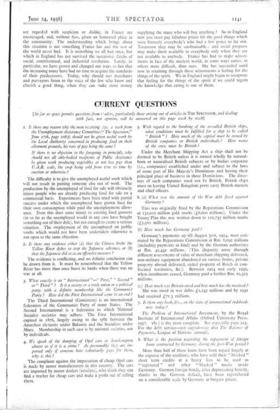CURRENT QUESTIONS
[So far as space permits questions from z ?ciders, particularly those arising out of articles in THE SPECTATOR, and dealing with fact, not opinion, will be answered on this page week by week] 1. Is there any reason why the man receiving 45s. a week from the Unemployment Assistance Committee (" The Spectator," June 17th, page 1083) should not be given useful work by the Local Authority concerned in producing food on their allotment grounds, his rate of pay being the same ?
If there is no objection to the foregoing in principle, why should not all able-bodied recipients of Public Assistance be given work producing vegetables at not less pay than U.A.B. scale, the crop being sold front time to time by auction or otherwise ?
The difficulty is to give the unemployed useful work which will not result in putting someone else out of work. The production by the unemployed of food for sale will obviously injure people who are already producing food for sale on a commercial basis. Experiments have been tried with partial success under which the unemployed have grown food for their own consumption while paid the unemployment allow- ance. Even this does some injury to existing food growers -(in so far as the unemployed would in any case have bought something out of their dole), but not enough to create a serious situation. The employment of the unemployed on public -works which would not have been undertaken otherwise is not open to the same objection.
2. Is there any evidence either (a) that the Chinese broke the Yellow River dykes to stop the Japanese advance, or (b) that the Japanese did so as an offensive measure ?
The evidence is conflicting, and no definite conclusion can be drawn from it. It must be remembered that the Yellow River has more than once burst its banks when there was no war at all.
3. What exactly is an " International "—" First," " Second " or " Third " ? Is it a society or a trade union or a political party with a definite membership like the Communist Party ? How did the First International come to an end ?
The Third International (Comintern) is an international federation of the Communist Party of many States. The Second International is a federation to which National Socialist societies may adhere. The First International expired in 1876, largely owing to the split between the Anarchist elements under Bakunin and the Socialists under Marx. Membership in each case is by national societies, not by individuals.
4. We speak of the dumping of Opel cars at Southampton almost as of it is a crime ! As presumably they are im- ported only if someone here voluntarily pays for them, why is this ?
The complaint against the importation of cheap Opel cars is made by motor manufacturers in this country. The cars are imported by motor dealers (retailers), who think they can find a market for cheap cars and make a profit out of selling them. 5. With regard to the bombing of the so-called British ships, what conditions must be fulfilled for a ship to be called " British " ? How much of the capital must be owned by British companies or British individuals ? How many of the crew must be British ?
Under the Merchant Shipping Act a ship shall not be deemed to be British unless it is owned wholly by natural- born or naturalised British subjects or by bodies corporate (i.e., companies) established under and subject to the laws of some part of His Majesty's Dominions and having their principal place of business in those Domin ions. The direc- tors of such companies need not he British. British ships must on leaving United Kingdom ports carry British masters and chief officers. • 6. (a) What was the amount of the War debt fixed against Germany ?
This was originally fixed by the Reparations Commission at 132,003 million gold marks (£6,600 millions). Under the Young Plan this was written down to 110,735 million marks (£5,5o3 millions).
(b) How much has Germany paid ?
Germany's payments up till August 31st, 1924, were esti- mated by the Reparations Commission at Rm. 8,092 millions (including payments in kind) and by the German authorities at Rm. 41,442 millions. (This disparity arose through different assessments of value of merchant shipping delivered, non-military equipment abandoned on various fronts, private property abroad delivered, ceded property of Reich in con- fiscated territories, &c.). Between 1924 and early 1932, when instalments ceased, Germany paid a further Rm. 10,315 millions.
(c) How much was Britain owed and how much has she received ? She was owed in war debts £1,245 millions and by 1931 had received £71.3 millions.
7. Is there any book, &c., on the state of international indebted- ness today ?
The Problem of International Investment, by the Royal Institute of International Affairs (Oxford University Press. 1937. as.) is the most complete. Sec especially page 223. For the debt service—not capital—sec also The Balance of Payments, League of Nations (annual).
8. What is the position regarding the repayment of foreign loans contracted by Germany during the post-War period ?
More than half of these loans have been repaid largely at the expense of the creditors, who have sold their " blocked " short term credits at a heavy loss to be used as " registered " and other " blocked " marks inside Germany. German foreign bonds, after depreciating heavily, thanks to the German default, have been repurchased on a considerable scale by Germans at bargain prices.














































 Previous page
Previous page